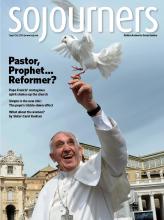When the Pharisees heard that [Jesus] had silenced the Sadducees, they gathered together, and one of them, a lawyer, asked him a question to test him. “Teacher, which commandment in the law is the greatest?” He said to him, “‘You shall love the Lord your God with all your heart, and with all your soul, and with all your mind.’ This is the greatest and first commandment. And a second is like it: ‘You shall love your neighbor as yourself.’ On these two commandments hang all the law and the prophets.” —Matthew 22:34-40
FAITHFUL PEOPLE are often stubborn people. Cambodian Buddhists are no exception. Truth-seekers in Cambodia sometimes spend a year living as beggars. They walk from village to village, trying to avoid the millions of remaining land mines. Their only possessions are a bright orange robe and a beggar’s bowl. After the ravages of Pol Pot and the Khmer Rouge regime, which dismantled community trust one forced-labor camp at a time, one might think the Buddhists would write off this ancient tradition, for no other reason than that it is grounded in the blind trust of perfect strangers. But faith, as Jesus taught, needn’t be any larger than a mustard seed. No regime, regardless how brutal, can eradicate faith.
This Cambodian Buddhist tradition of giving your entire well-being over to a community of strangers is one that has something to say to those of Christian faith. Giving yourself over to poverty, over to those who don’t know you from Adam, must change a person. After spending a year as an intentional beggar, as theologian Barbara Brown Taylor notes, you’d be hard pressed to differentiate yourself from all those “others” we tend to pity, fear, admire, or despise.
Read the Full Article
